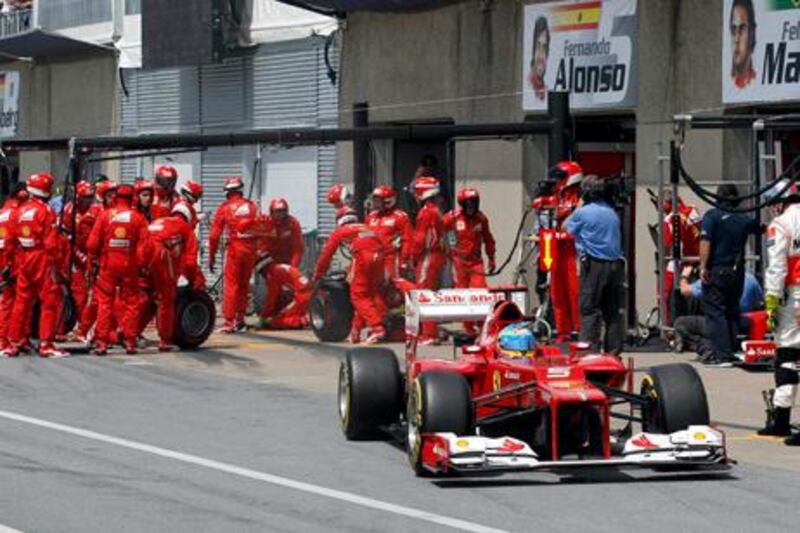MONTREAL // Pat Fry, Ferrari's technical director, pleaded on Sunday that Ferrari's critics look at the team's performance with a cool head, rather than with the emotive images of Fernando Alonso's self-imposed capitulation still in the mind. Having watched the warm Montreal sun slip beneath the horizon and rise again a few hours later, a cool mind is now here, chilling.
Yet nothing has changed.
The Italian manufacturers, in deploying a one-stop strategy with Alonso at the Canadian Grand Prix, played a high-stakes game of chess and lost. Crucially, the decision lost them a podium and the championship lead in the drivers' standings.
The Spanish driver, running in second place and looking set to take 18 points home from Circuit Gllles Villeneuve, got scent of a possible victory and - instead of pitting for fresh tyres along with Lewis Hamilton, the car in front - stayed out to inherit the lead and a potential seven additional points. But with his tyres degrading quickly, his team knew it was a dangerous tactic and it did not pay off. Alonso was passed first by Hamilton, then by Romain Grosjean, then by Sergio Perez, then, gallingly, by Sebastian Vettel.
The two-time world champion finished the race in fifth and took home 10 points. Essentially, instead of claiming the additional seven points the team were chasing, they lost eight. Say what you like about Ferrari's successful, storied history, but that is not how you win championships.
The reason Vettel's pass must have been so galling for Alonso is because the German's Red Bull Racing team also found themselves having to quickly decide whether to alter strategy, and they made the right call. The reigning champion, having lost tyre grip, was passed by Hamilton, but immediately pitted for fresh rubbers in a bid to salvage something and not slip down the field. He finished fourth. Had Alonso deployed the same tactic, he would have been able to fight for a podium.
The opposing decisions by Red Bull and Ferrari are a prime example of what makes a championship-winning team. Both marques knew a win was unlikely, but while Christian Horner's team played it safe, Stefano Domenicali and Co went for broke. The Ferrari post-race press release summed it up as "Red Does Not Come Up In The Montreal Casino", but the risk was not necessary.
In a season that has produced seven different winners from seven races, it is abundantly clear that consistency is key. Hamilton even said pre-race that while he wanted to win, he was content to simply keep finishing near the front. It is, after all, points rather than race wins that bring prizes.
Hamilton, post-race, praised his team's strategy, but there was more than a hint of good fortune about how the McLaren-Mercedes's plan paid off. Had Alonso pitted a second time as he should have, the error in the pits that saw the Englishman lose five seconds, would have seen the rest of his race pan out differently. Fundamentally, Ferrari's poor strategic call, papered over McLaren's crack.
Three drivers, three different strategies, one winner. Yet the most impressive strategy arguably belonged to Red Bull. And who leads the constructors championship? Take one guess.
gmeenaghan@thenational.ae
Follow us
[ @SprtNationalUAE ]
and Gary Meenaghan
[ @GMeenaghan ]





